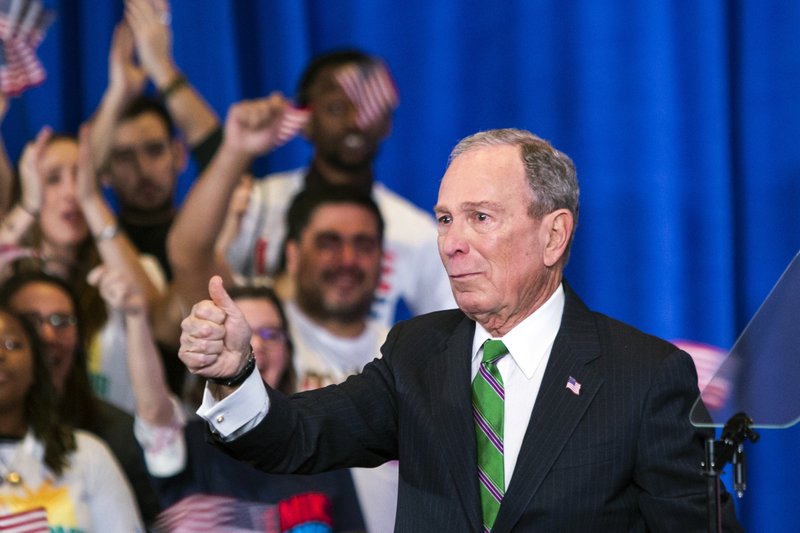What does more than $500 million get you? For Mike Bloomberg, it was 175 winning votes in this U.S. territory — a group of Pacific islands with lush vegetation and stunning coastlines some 7,200 miles from where he once served as New York City’s mayor.
Bloomberg’s lone primary victory in American Samoa, population 55,000, was an unorthodox and dubious culmination to a much-hyped but short-lived Democratic presidential campaign marked by unprecedented spending designed to make a splash in Super Tuesday states.
In the middle of the Pacific Ocean, he did it.
Bloomberg on Tuesday won half of the 351 Democrats voting in the American Samoa caucus, picking up five delegates before he dropped out of the race and endorsed Joe Biden on Wednesday.
U.S. Rep. Tulsi Gabbard of Hawaii, who was born in American Samoa, received one delegate. Bloomberg’s decisive win over the local-born Gabbard was startling, but the Hawaii congresswoman had a late start campaigning in the territory compared with the billionaire.
Bloomberg installed seven full-time staff members in American Samoa in recent weeks — more than any other campaign — and bought up billboards and ads on television, online, in print and on the radio—including Samoan language ads.
He even picked up an endorsement Monday from Samoan Chief Fa’alagiga Nina Tua’au-Glaude, who cited Bloomberg’s work spending millions to fight climate change that the chief says will be devastating to the islands. Bloomberg tweeted a photo Tuesday of two team members in campaign T-shirts, saying they were getting out the vote and cleaning up a park.
“Our incredible team in American Samoa, who calls themselves ‘Protectors of the Earth,’ not only got out the vote but took time out of their day to clean up a park,” Bloomberg tweeted Tuesday, hours before getting disappointing results in other Super Tuesday contests.
Patrick Ti’a Reid, a local Bloomberg staffer, said the campaign set up voter events where they pitched his policy plans to locals and helped organize a trash cleanup at a local coastal park over the weekend.
Nathaniel Savali, a Democrat and staunch Bloomberg supporter, said he was most impressed by Bloomberg’s decision to place staff on the island and make a serious effort to win support.
“They were mindful of our sensitivities to cultural preservation and relayed back to the campaign headquarters the concerns of our people,” Savali said. “They also offered solutions with the promise that the U.S. territories would not be forgotten under a Bloomberg presidency.”
Tony Langkilde, who helped campaign for Gabbard, said her campaign began in earnest there just three days before Super Tuesday.
“I got a call from Tulsi’s father in Honolulu,” Langkilde said. “We actually started Friday to work on a local campaign.”
Langkilde said he met with Gabbard’s brother, who lives in American Samoa, and began putting together print and radio ads in both English and Samoan. They printed shirts, visors and launched a social media campaign that Langkilde said garnered a lot of attention. Gabbard sent a video to rally her supporters.
“During the caucus, there were supporters there coming in to support a local girl, but it’s just that we started late,” Langkilde said. “If we started campaigning much earlier, I think the response would have been much greater.”
It’s not the first time the islands have delivered a win to someone other than the candidate who boasted a cultural link to the Pacific. In 2008, Hillary Clinton gained Democrats’ support in American Samoa over Barack Obama, who was born in Hawaii and whose roots supporters played up.
The islands between Hawaii and New Zealand include a land area roughly the size of Washington, D.C., where tuna fishing and processing is a major driver of the economy and most residents are bilingual, Christian and Pacific Islander.
The territory’s residents are U.S. nationals but not citizens, which leaves them unable to vote in presidential elections but allows them to participate in presidential primary contests run by political parties.
Though no White House hopeful made a campaign stop in the islands and its capital of Pago Pago, at least an 18-hour flight from Washington, D.C., Joe Biden visited four years ago.
While serving as Obama’s vice president in 2016, Biden made a brief stop in Pago Pago while his plane was refueling as he headed from Hawaii to Australia and New Zealand. Biden was met by a local delegation led by the governor, shook hands and posed for photos.
The 90-minute visit doesn’t seem to have helped his campaign much four years later. He placed fourth in the territory’s caucuses Tuesday.
(AP)











